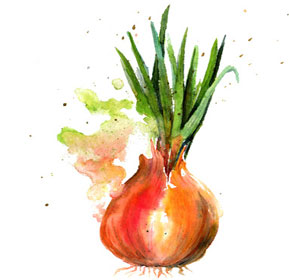





1. Onion Facts
2. Types of Onion
3. Onion Nutritional value
4. Onion Health Benefits
One of the most cultivated and widely used vegetables, the onion is a member of the Amarylidaceae family. The onions flesh or bulb is grown underground and is known for its high nutritional value and sought-after flavour. Used in more recipes that nearly every other vegetable.
History and Origin
Many archaeologists, botanists, and food historians believe onions originated in central Asia. Other research suggests onions were first grown in Iran and West Pakistan. Most researchers agree the onion has been cultivated for 5000 years or more. Since onions grew wild in various regions, they were probably consumed for thousands of years and domesticated simultaneously all over the world.
Onions may be one of the earliest cultivated crops because they were less perishable than other foods of the time, were transportable, were easy to grow, and could be grown in a variety of soils and climates. In addition, the onion was useful for sustaining human life. Onions prevented thirst and could be dried and preserved for later consumption when food might be scarce.
- • Brown Onion
- • Red Onion
- • White Onion
Brown Onion
This is the most widely used Australian onion. Has a brown to yellow completion with creamy white coloured flesh. Has a strong pungent flavour that becomes wonderfully sweet when cooked.
Choose firm, blemish-free onions and avoid onions that have green shoots.
Red Onion
Red onions have purplish red skin with white flesh tinged with red. They are often used in salads for their colour and mild sweet flavour
They can be stored 3 to 4 months under ideal conditions.
White Onion
White onions are the strongest in flavour after brown and red onions. Onions Australia state that our consumers on average buy less white and more brown and red onions.
Vegetables " Onion "
Nutritional value per 100 g
Onions, cooked, boiled, drained, without salt
| Nutrient (Proximity) |
Unit
|
Value
|
Daily Value %
|
|
Energy
|
kcal
|
44 | 1.1% |
|
Protein
|
g
|
1.36 | 2.7% |
|
Total lipid (fat)
|
g
|
0.19 | 0.2% |
|
Carbohydrate, by difference
|
g
|
10.15 | 3.8% |
|
Fiber, total dietary
|
g
|
1.4 | 5% |
|
Sugars, total
|
g
|
4.73
|
|
|
Minerals
|
|||
|
Calcium, Ca
|
mg
|
22 | 1.6% |
|
Iron, Fe
|
mg
|
0.24 | 1.3% |
|
Magnesium, Mg
|
mg
|
11 | 2.6% |
|
Phosphorus, P
|
mg
|
35 | 2.8% |
|
Potassium, K
|
mg
|
166 | 3.5% |
|
Sodium, Na
|
mg
|
3 | 0.1% |
|
Zinc, Zn
|
mg
|
0.21 | 1.9% |
|
Copper, Cu
|
mg
|
0.067 | 7.4% |
|
Manganese, Mn
|
mg
|
0.153 | 6.7% |
|
Selenium, Se
|
mcg
|
0.6 | 1% |
|
Vitamins
|
|||
|
Vitamin C, total ascorbic acid
|
mg
|
5.2 | 5.7% |
|
Thiamin (B-1)
|
mg
|
0.042 | 3.5% |
|
Riboflavin (B-2)
|
mg
|
0.023 | 1.7% |
|
Niacin (B-3)
|
mg
|
0.165 | 1% |
|
Pantothenic acid (B-5)
|
mg
|
0.113 | 2.2% |
|
Vitamin B-6
|
mg
|
0.129 | 7.5% |
|
Folate, total (B-9)
|
mcg
|
15 | 3.7% |
|
Vitamin B-12
|
mcg
|
0.00
|
|
|
Vitamin A, RAE
|
mcg
|
0 | |
|
Vitamin E (alpha-tocopherol)
|
mg
|
0.02 | 1.3% |
|
Vitamin D (D2 + D3)
|
mcg
|
0
|
|
|
Vitamin K (phylloquinone)
|
mcg
|
0.5 | 0.4% |
|
Lipids
|
|||
|
Saturated Fatty Acids
|
g
|
0.031
|
0.1% |
|
Monounsaturated Fatty Acids
|
g
|
0.027
|
|
|
Polyunsaturated Fatty Acids
|
g
|
0.073
|
|
|
Trans Fatty Acids
|
g
|
0.000
|
|
|
Carotenoids
|
|||
|
Beta-Carotene
|
mcg
|
1
|
|
|
Alpha-Carotene
|
mcg
|
||
|
Beta-Cryptoxanthin
|
mcg
|
||
|
Lutein + zeaxanthin
|
mcg
|
4
|
|

|
Reference Values are based on a 2,000 Calorie Intake, for Adults and Children 4 or More Years of Age. Your daily values may be higher or lower depending on your calorie needs.
|
|
Percentages are roughly approximated using (RDA) Recommended Dietary Allowances for adults. Source: Nutrient Database - USDA (United States Department of Agriculture)
|
|
Reference Values for Nutrition - FDA U.S. Food and Drug Administration
|
Onion Nutritional Value
Onions have many health benefits. The Allium genus includes approximately 500 species
Onions provide health benefits by boosting immunity, supporting heart health, and aiding gut health through their content of vitamins like C and folate, as well as antioxidants such as quercetin and sulphur compounds. They can also help with blood sugar control, bone health, and may offer anti-cancer and anti-inflammatory properties.
Add onion to your diet to reduce blood sugar levels, maintain bone health, protect against allergies, protect against infections, treat urinary disorders, stimulate hair growth, fight cancer, promote gastrointestinal health, give remedy to colds and influenza and to promote good skin.
- REGULATES BLOOD SUGER
Onions may help regulate blood sugar due to compounds like quercetin and sulphur compounds, which can improve insulin sensitivity, increase insulin secretion, and help the body take up glucose. Studies have shown that consuming raw onions can lead to a significant reduction in blood sugar levels. - MAINTAINS BONE HEALTH
Onions help maintain bone health by potentially increasing bone density and reducing bone loss, particularly in postmenopausal women. This is due to antioxidants like quercetin that can inhibit bone breakdown and promote bone building, as well as other compounds that may improve bone density and reduce the risk of hip fractures. - IMMUNE SYSTEM SUPPORT
Onions support the immune system by providing Vitamin C, antioxidants like quercetin, and anti-inflammatory compounds. These components help protect cells, fight inflammation, and support immune function, while also offering antimicrobial and prebiotic properties to promote gut health. Eating onions as part of a balanced diet can help with overall immune health. - POTENT ANTIBACTERIAL ACTIVITY
Onions exhibit potent antibacterial activity due to compounds like allicin (thiosulfinates) and flavonoids (especially quercetin). These compounds can inhibit a wide range of bacteria, including both gram-positive and gram-negative pathogen. - DETOX YOUR BODY OF HEAVY METALS
Garlic and onions contain sulphur compounds, which helps your liver detoxify itself of heavy metals like lead and arsenic.

- ANTI-INFLAMMATORY
Onions have anti-inflammatory properties due to their high antioxidant content, particularly the flavonoid quercetin. These compounds can help reduce inflammation in the body, which may benefit conditions like arthritis, support heart health, and protect against cell damage. - CANCER-FIGHTING PROPERTIES
Onions have potential cancer-fighting properties due to compounds like quercetin and sulphur-containing compounds, which are antioxidants that may inhibit cancer cell growth and progression. Studies have shown a link between higher onion consumption and a lower risk of certain cancers, including laryngeal, ovarian, and endometrial cancers, as well as some gastrointestinal cancers. - GOOD FOR DIGESTION
Onions are good for digestion because they contain prebiotic fiber, like fructans, that feeds beneficial gut bacteria. This promotes a healthy gut microbiome, which can improve digestion, nutrient absorption, and overall gut health. However, some individuals with sensitive guts or IBS may experience digestive issues like bloating or gas due to these fermentable carbohydrates. - PROTECTS FROM HEART DISEASE
Onions contain antioxidants and compounds that may reduce your risk of heart disease. They contain quercetin, a flavonoid antioxidant and anti-inflammatory that may help lower high blood pressure. - PROTECTS FROM TOOTH DECAY
Raw onions help protect against tooth decay by containing antimicrobial and antibacterial sulphur-containing compounds that kill harmful bacteria responsible for cavities and gum disease.
References
Nutrient Database - USDA (United States Department of Agriculture)
Reference Values for Nutrition - FDA U.S. Food and Drug Administration
Regulates blood sugar - Onions may help regulate blood sugar due to compounds like quercetin and sulphur compounds, which can improve insulin sensitivity, increase insulin secretion, and help the body take up glucose. Studies have shown that consuming raw onions can lead to a significant reduction in blood sugar levels.
Maintains bone health - Onions help maintain bone health by potentially increasing bone density and reducing bone loss, particularly in postmenopausal women. This is due to antioxidants like quercetin that can inhibit bone breakdown and promote bone building, as well as other compounds that may improve bone density and reduce the risk of hip fractures.
Cancer-fighting properties - Onions have potential cancer-fighting properties due to compounds like quercetin and sulphur-containing compounds, which are antioxidants that may inhibit cancer cell growth and progression. Studies have shown a link between higher onion consumption and a lower risk of certain cancers, including laryngeal, ovarian, and endometrial cancers, as well as some gastrointestinal cancers.
Protects from tooth decay - Raw onions help protect against tooth decay by containing antimicrobial and antibacterial sulphur-containing compounds that kill harmful bacteria responsible for cavities and gum disease. While onions are good for oral health, their strong odour means you should brush your teeth afterward to remove any lingering bacteria and food particles.
Potent antibacterial activity - Onions exhibit potent antibacterial activity due to compounds like allicin (thiosulfinates) and flavonoids (especially quercetin). These compounds can inhibit a wide range of bacteria, including both gram-positive and gram-negative pathogens, and can be used in food preservation.
Good for digestion - Onions are good for digestion because they contain prebiotic fiber, like fructans, that feeds beneficial gut bacteria. This promotes a healthy gut microbiome, which can improve digestion, nutrient absorption, and overall gut health. However, some individuals with sensitive guts or IBS may experience digestive issues like bloating or gas due to these fermentable carbohydrates.
Anti-inflammatory - Onions have anti-inflammatory properties due to their high antioxidant content, particularly the flavonoid quercetin. These compounds can help reduce inflammation in the body, which may benefit conditions like arthritis, support heart health, and protect against cell damage.
Immune system support - Onions support the immune system by providing Vitamin C, antioxidants like quercetin, and anti-inflammatory compounds. These components help protect cells, fight inflammation, and support immune function, while also offering antimicrobial and prebiotic properties to promote gut health. Eating onions as part of a balanced diet can help with overall immune health.
Protects from heart disease - Onions contain antioxidants and compounds that may reduce your risk of heart disease. They contain quercetin, a flavonoid antioxidant and anti-inflammatory that may help lower high blood pressure.
Detox your body of heavy metals - Garlic and onions contain sulphur compounds, which helps your liver detoxify itself of heavy metals like lead and arsenic.
Onions help regulate blood sugar - Due to the chromium and sulphur compounds they contain. Chromium helps improve insulin efficiency and the passage of glucose into cells, while sulphur compounds (like S-methylcysteine and quercetin) stimulate insulin production, increase the body's sensitivity to it, and reduce sugar absorption.
Onions and bone health - Compounds in onions, such as flavonoids and sulphur-containing compounds, which are thought to prevent bone breakdown and support collagen production. Onions also support bone health by improving calcium absorption through the gut and by providing antioxidants.
Onions have potential anti-cancer properties - Their high content of quercetin, a flavonoid antioxidant, and organosulfur compounds.
Onions and tooth protection -By killing harmful oral bacteria due to their antimicrobial and antibacterial properties, which are primarily attributed to their sulphur compounds.
Onions have potent antibacterial properties - Due to the presence of sulphur compounds like allicin and flavonoids.
Onions are good for digestion - Because they contain the prebiotic fiber oligofructose (a type of fructooligosaccharide or FOS. This fiber passes undigested to the large intestine, where it serves as food for beneficial gut bacteria, promoting a healthy digestive system). The increased growth of good bacteria helps with digestion, can improve bowel habits, and may even reduce the risk of certain types of diarrhoea and colon cancer.
Onions have anti-inflammatory properties - Largely due to their organosulfur compounds and flavonoids like quercetin, which combat oxidative stress and modulate immune responses. These compounds help reduce pro-inflammatory markers and pathways, contributing to the prevention of chronic diseases linked to inflammation, such as cardiovascular disease and certain cancers.
Onions strengthen the immune system - Because their polyphenols, particularly quercetin, act as potent antioxidants. These antioxidants neutralize free radicals, which are unstable molecules that can damage cells and DNA. By protecting the body from this oxidative stress, onion polyphenols help maintain overall cellular health and support a robust immune response to fight illness.
Onions protect from heart disease - Containing a powerful antioxidant Quercetin, it has been shown to help promote a healthy heart and brain as well as reduce the risk of certain lifestyle diseases.
Detox your body of heavy metals - Herbs like garlic and onions both contain essential minerals and sulphur, which helps with heavy metal poisoning. It is great for arsenic detox, as well as for lead exposure detox.
